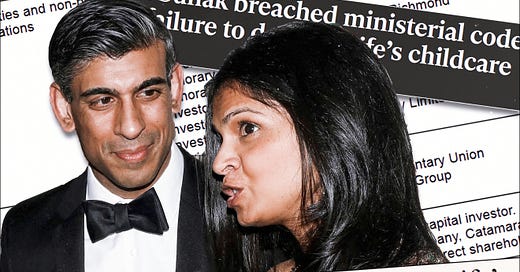The Prime Minister's ignorance towards his wife's assets and investments does not excuse conflicts of interest where they obviously and so frequently exist
Back in April, I wrote that Sunak may have breached the ministerial code of conduct over his failure to declare an obvious conflict of interest relating to his family’s interests in Koru Kids.
It has been found that following a short investigation by the Parliamentary Commissioner for Standards, Daniel Greenberg, that Sunak had “inadvertently” breached the ministerial code.
This page is troubled by use of the word “inadvertently” - that is, to suggest it was accidental, a genuine mistake, an oversight; or, ‘oops, I seem to have misplaced knowledge of how my wife had direct shareholdings in a company that would have benefitted from a childcare policy first announced in the Spring budget - my mistake.’
Yet for somebody who is apparently ‘a details man’, it seems rather strange that Sunak would “inadvertently”overlook the possibility of a conflict of interest in this case.
It’s also rather strange that this matter would be considered “inadvertent” when, actually, it seems to form as a continued pattern of behaviour when it comes to his wife’s investments - many of which “inadvertently” appear to benefit from various government schemes.
How much Sunak - or his wife, rather - would stand to benefit is mostly irrelevant. Incidentally, it isn’t clear what dividend or other earnings her shareholding might yield though according to Sunak, his wife’s shares “equate to around 1% of the shareholding of the company.”
What matters is the idea that he might benefit at all and/or directly from a government policy, and whether this idea of having made an “inadvertent” error when not declaring the interest provides an acceptable resolution.



